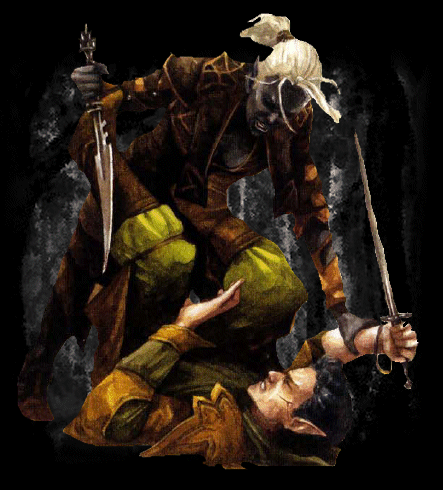

Attitudes towards order and chaos are divided into three opposing beliefs. Picture these beliefs as the three points of a triangle, all pulling away from each other. The three beliefs are Law, Chaos and Neutrality. One of these represents each characters ethos - his understanding of society and relationships.
The believers in chaos hold that there is no preordained order or careful balance of forces in the universe. Instead they see the universe as a collection of things and events, some related to each other and others completely independent. They tend to hold that individual actions account for the differences in things and the events in one area do not alter the fabric of the universe halfway across the galaxy. Chaotic philosophers believe in the power of the individual over his own destiny and are fond of anarchistic nations. Being more pragmatic, non-philosophers recognize the function of society in protecting their individual rights. Chaotics can be hard to govern as a group, since they place their own needs and desires above those of society.
Like law and order, the second set of attitudes is divided into three parts. These parts describe, more or less, a character's moral outlook; they are his internal guideposts to what is right or wrong.
Evil is the antithesis of good and appears in many ways, some overt and others subtle. Only a few people of evil nature actively seek to cause harm or destruction. Most simply do not recognize that what they do is destructive or disruptive. People and things that obstruct the evil character's plans are mere hindrances that must be overcome. If someone is harmed in the process... well, that's too bad. Remember that evil, like good, is interpreted differently in different societies.
These characters believe in using society and its laws to benifit themselves. Structure and organization elevate those who deserve to rule as well as provide a clearly defined hierarchy between master and servant. To this end, lawful evil characters support laws and societies that protect their own concerns. If someone is hurt or suffers because of a law that benifits lawful evil characters, too bad. Lawful evil characters obey laws out of fear of punishment. Because they may be forced to honor an unfavorable contract or oath they have made, lawful evil characters are usually very careful about giving their word. Once given, they break their word only if they can find a way to do it legally, within the laws of the society. An iron-fisted tyrant and a devious, greedy merchant are examples of lawful evil beings.
- Always keeps his word of honor. (But is careful on who he gives it to.)
- Lies and cheats those not worthy of his respect.
- May or may not kill an unarmed foe.
- Rarely kills an innocent but will definitely harm, harass or kidnap.
- Never tortures for pleasure but will to extract information.
- Never kills for pleasure - always has a reason.
- May or may not help someone in need.
- Respects honor and self-discipline. Has no time for the law.
- Will work with others to attain his goals.
- May take dirty money.
- Never betrays a friend. (Friend? Drow? Very rare.)